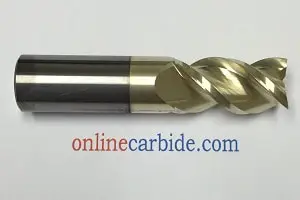Machinists can take their pick of end mills and drills made from a wide range of materials, including HSS (high-speed steel), powdered metal, polycrystalline diamond, and of course solid carbide end mills for sale.

The latter offers CNC machinists performing high-speed cutting operations a number of benefits. Here’s some basic information you need to know.
What Is a Carbide? Why Use Solid Carbide End Mills?
A carbide is a chemical compound composed of carbon and a similarly electronegative (or less electronegative) element or compound, commonly metal or a metal oxide. Carbides are commonly formed from carbon and metals like cobalt or tungsten, known as cobalt carbide and tungsten carbide, specifically.
Solid carbide end mills offer several advantages over some alternative options in cutting tools. Solid carbide is very hard and offers more rigidity than HSS. They are also more suitable for high-speed cutting applications, and are extremely resistant to high heat and oxidation, giving them longer operating lifespans.
Types of End Mills
There are a variety of solid carbide end mills for sale, including:
● Square end mills: Typically used for general milling applications like slotting and profiling. They can also be used for plunge cutting.
● Ball end mills: Ball end mills are also known as ball-nose end mills and have a noticeably rounded “nose” or “point.” They are used for milling and slotting contoured surfaces.
● Roughing end mills: Roughing end mills tend to have several rows of fine teeth along their cutting surfaces. They are used for removing larger amounts of stock material during forming and “roughing.” They leave a rough finish, hence the name.
● Tapered end mills: They have a tapered point and can be used for contouring, plunge cutting, side milling, and other applications; also suitable for machining angled slots.
● Drill mills: Drill mills are versatile cutting tools that can be used for spotting, chamfering, countersinking, plunge cutting, and several other cutting applications.
This list is not complete but contains many examples of commonly used solid carbide end mills. Others include roughing and finishing end mills, corner rounding and radius end mills, and keyway end mills, among others.
Types of Flutes
All end mills contain flutes, which are the grooves that are cut into the body of the tool. They contain the cutting teeth along their edges, where present (depending on the type of mill). A higher flute count increases the strength and rigidity of the tooth but reduces chip flow. Fewer flutes enable greater chip flow.
● Single flute: Extra chip space makes single flute cutting tools suitable for rapid material removal.
● Two flute: Also has good chip-carrying capacity; can be useful for pocketing and slotting.
● Three flute: Stronger than 2 flutes, also used for slotting and pocketing both non-ferrous and ferrous materials like steels and cast iron.
● Four flute (multiple flute): Additional flutes create a stronger overall design, making these suitable for higher feed rates and faster cutting, but chip evacuation can become problematic. The additional flutes also leave a finer finish.
Looking for Solid Carbide End Mills for Sale?
Looking for high-quality solid carbide end mills for sale? Visit Online Carbide for high-performance carbide end mills, drill mills, chamfer mills, and other cutting tools.
Their high-performance cutting tools are available at reasonable prices and certain orders qualify for free shipping. Visit their website at the link above or contact their customer service team at Sales@OnlineCarbide.com for additional details.
For more information about Variable End Mill and End Mills For Aluminum Please visit: Online Carbide.



